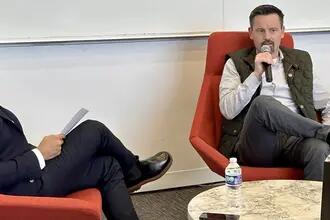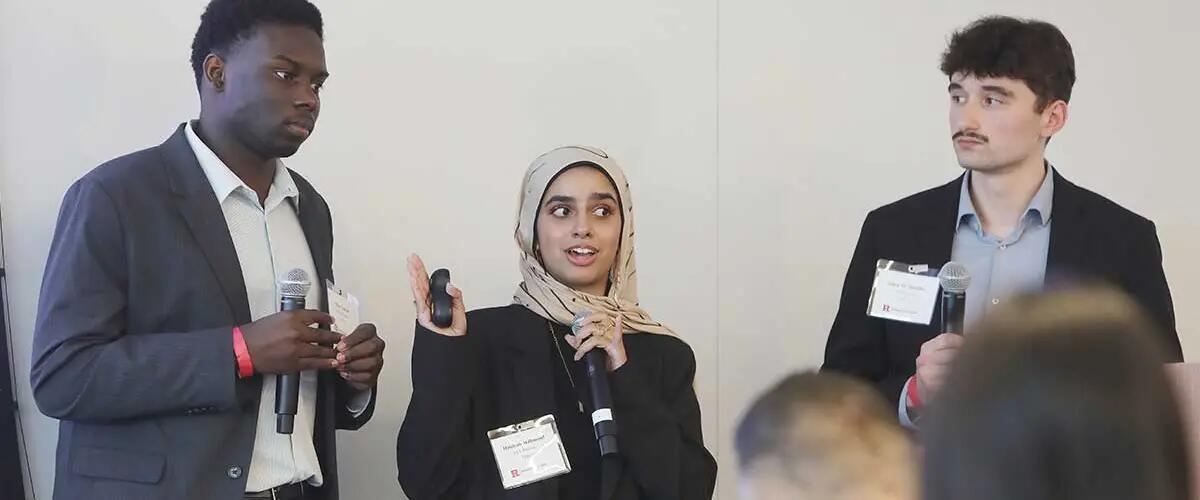
Team 9 members Allan Peprah, Haniyah Mahmood and Aiden De Meulder present during the final round of the Experiential Learning Showcase.
Competition offers students a chance to demonstrate impact of experiential learning
Two members of the social entrepreneurship student organization Enactus won the first prize of $8,000 at Rutgers Business School’s Experiential Learning Showcase for effectively detailing how lessons in management and finance enabled them to expand a nascent hydroponic farming venture.
With a blend of passion and poise, Rithik Kapadia, a senior majoring in accounting, and Léo Moreno, a junior studying finance, emerged as the top winners in a tight, final round of six teams vying for $20,000 in prize money.
They are part of a team of students who have helped Enactus’s Agoraponic Farms address food insecurity at Rutgers and the New Brunswick area, using hydroponic systems – a soil-less farming technique that requires little space – to grow $4,000 worth of produce last year. Their produce is distributed through partnerships with a campus café and a student basic needs center.
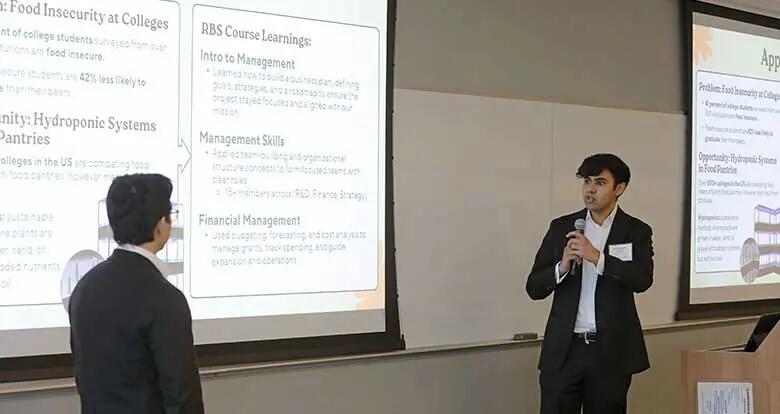
The judges awarded the $7,000 second prize to a team of finance students – Malik Vazquez, Issa Jadallah and Jose Jimenez Gratereaux – who are members of the Association of Latino Professionals for America at Rutgers Business School-Newark. They created a student-managed investment fund that will pay out scholarships to ALPFA members.
The ALPFA Fund team also won the Rutgers Choice Award after receiving the highest number of votes from spectators at the event.
Senior accounting student Kevin Cheung won the third prize of $5,000 after detailing how he led members of Beta Alpha Psi last year a volunteer effort to prepare tax returns for low-income New Brunswick residents.
In all, 71 students from across Rutgers Business School’s two campuses – a mix of both undergraduate and graduate – competed in the inaugural event. The entries they detailed to judges and spectators ranged from business ventures and co-op experiences to services the students performed using knowledge from their studies.
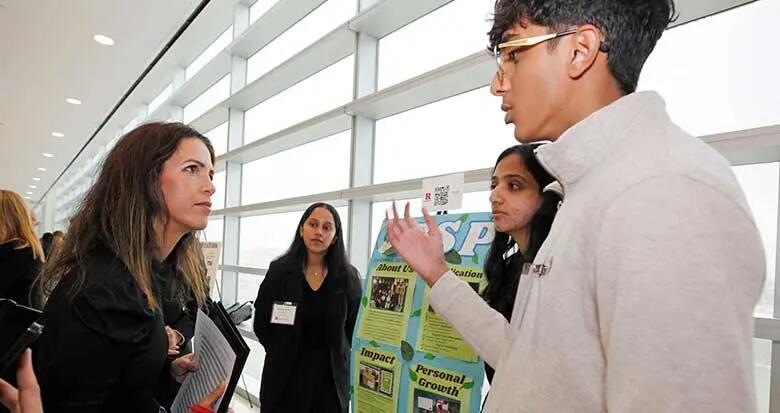
The Experiential Learning Showcase was intended to offer students a platform where they were able to demonstrate the essence of experiential learning – how they have applied the knowledge and skills learned in classes to real world business problems or opportunities. It went further though, asking them to describe the impact of their efforts and to reflect on the personal and professional growth they gained as a result.
Professor Mason Ameri, executive director of experiential learning who organized the event, described experiential learning as part of the DNA at Rutgers Business School – evident in every discipline, course and co-curricular activity. “We’re showcasing something that happens every day inside the business school,” Ameri said.
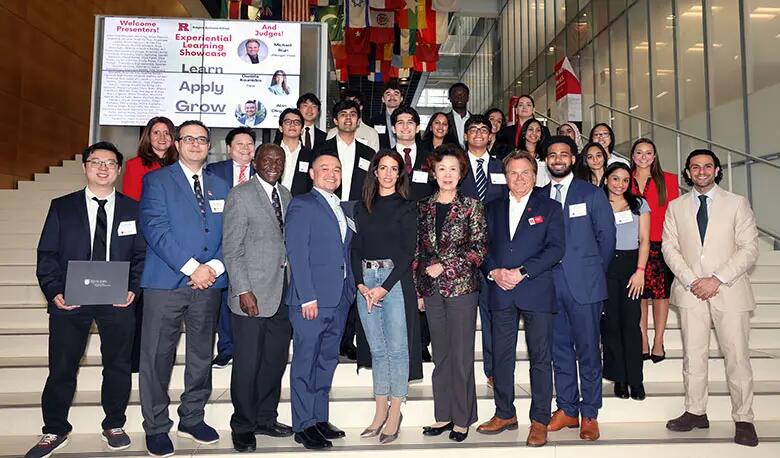
Michael IIcyn, a JP Morgan Chase executive and one of three judges, uttered one word as he began to announce the winners and the impact of their projects. “Wow,” he said.
The judges were struck by the potential impact of the winning projects, he said, as well as the maturity and skill of the students. “You’ve done a tremendous job for where you are in your career journey,” he said. In addition to IIcyn, Daniela Koumides, a Rutgers MBA alumna who is employed at Cigna, and Alan Olegario, an account director Microsoft and Rutgers engineering alumnus, served as judges.
Ameri said the showcase is a first step in highlighting the broad experiential learning footprint within Rutgers Business School. “We deployed the event to celebrate the outstanding work of our students, but just as importantly, to spotlight a foundational component of experiential learning that is often unobserved: reflection,” he said.
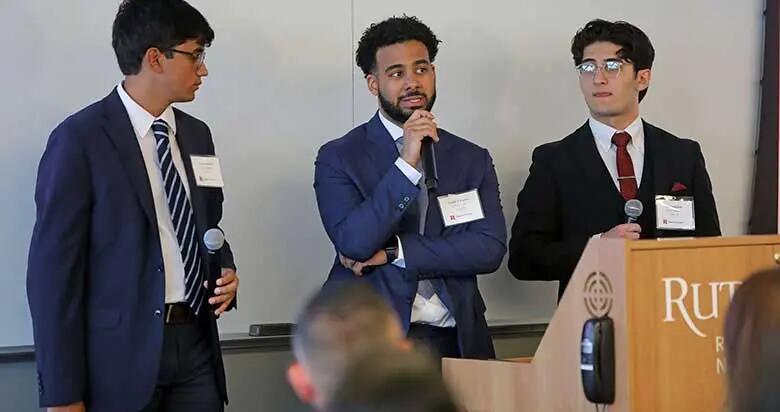
Each team was required to create a poster board explaining their project, its impact, what classes were applied to the project and what they gained through the experience. During the first round, the three judges went to each poster, individually listening to the students, asking questions and offering feedback. After the first round, the judges narrowed the field to six finalists.
The finalists were required to do a pitch-styled presentation detailing their experiential learning experience, the knowledge they applied and what they gained from their efforts.
The students managing the ALPFA Fund told the judges that along with using knowledge from their finance classes to find undervalued investing opportunities and identifying different stock styles, they had also learned discipline and patience by holding workshops to provide other members with an understanding of the investment world.
“Yes, we are managing a fund, but we’re also investing in people,” Vazquez told the judges.
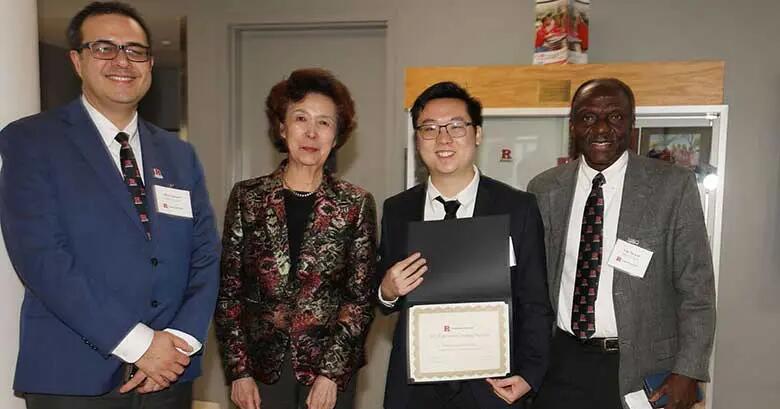
Cheung told the judges he gained project management experience and delegation skills by leading the students who manned tables at the New Brunswick Public Library to help prepare hundreds of tax returns. But he also learned soft skills, he said, demonstrating some of them as he recounted how a correction on a single mother’s tax return provided her with an additional $12,000 to spend on food or housing or clothing.
Kapadia and Moreno, the first-place winners, won points for their knowledge of the metrics around the venture and for their public speaking skills. Public speaking was one of the ways the two students said they grew through the experience of trying to raise funds to sustain Agoraponic Farms in pitch competitions.
“This win is truly trajectory-changing,” Moreno said after the competition. “It gives us the resources to grow the project in a meaningful way and bring our impact to the next level.”
Press: For all media inquiries see our Media Kit


